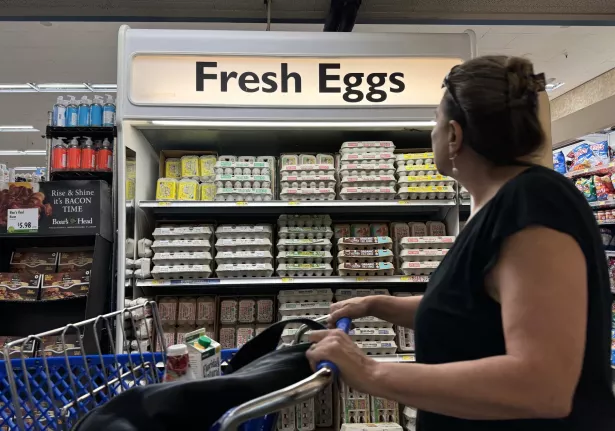People get emotional about eggs. After years of reporting on price spikes, supply chain snags and shortages of everything from cocoa to coffee to copper, the only thing I’ve ever seen come close to eliciting egg-level emotion is gas prices … and Taylor Swift tickets.
Politicians know this—last month Republican vice presidential candidate JD Vance singled out eggs at a news conference. Standing in front of a large supermarket display, Vance said: “Eggs, when Kamala Harris took office, were short of $1.50 a dozen. Now a dozen eggs will cost you around $4.00.”
Although critics later pointed out a sign behind Vance advertising eggs at $2.99 a dozen, prices broadly are up almost 150% since 2020, from about $1.30 a dozen then, to $3.20 today. The main culprit, however, isn’t the Biden administration’s policies. A brutal bout of avian flu this year has caused producers to slaughter tens of millions of egg-laying hens. That’s decimated the supply and pushed up prices.
Eggs were also a noticeable black mark on last month’s largely positive inflation report. Overall prices rose by an average of just 2.5%, but egg prices jumped more than 28%
There’s something going on here beyond normal price fluctuations. Eggs hold an almost mythical place in many cuisines. Legendary chef Jacques Pépin has said he can measure the skill of a chef by watching them prepare a French omelet. Eggs are an essential ingredient in countless recipes around the globe: breads, biscuits, cakes, meatloaf, dumplings, noodles, sauces and even some cocktails. When avian flu hammered Australia this year, McDonald’s restaurants there had to cut back breakfast hours. Escaping eggs isn’t easy.
Typically, when the price of something rises by as much as eggs have this past year, people will buy less of it. That lowers demand, which then tends to bring down prices. That’s not the case with eggs. “Demand for eggs is relatively inelastic,” says Bill Lapp, president of Advanced Economic Solutions, which forecasts commodity prices. “Inelastic demand,” you might remember from high school economics, is when, even if the price gets so high you feel your heart burning with the fury of a thousand dying suns, you still hand over your credit card. Eggs are in this category (along with gasoline … and Taylor Swift tickets). In spite of egg prices more than doubling in the past four years, the average American eats about one egg a day. That’s been the case for decades.
One reason for eggs’ inelasticity, Lapp says, is economics. Eggs are one of the cheapest forms of protein around. Consumers count on them as a backstop. If beef gets expensive, they can switch to pork. If pork prices spike, they opt for turkey or chicken. If turkey and chicken get pricey, they turn to eggs. But when eggs get expensive, there’s nowhere else to go.
“Eggs are a big deal for a lot of people on a budget,” says Jenna Thurston, 36 and a mother of three in Lancaster, Wisconsin. Thurston, aka EBT Mama, runs a popular Facebook group and TikTok account where she posts information about SNAP benefits, food prices and local deals. Her more than 300,000 followers rely on her counsel and exchange advice about the struggles of feeding families on a tight budget.
Last year, when egg prices spiked, Thurston found the cheapest source she could: a 60-egg box from Walmart. She would regularly post the price she saw at her location and her online community would jump in with the price at their local store. She stopped posting after egg prices calmed down earlier this year.
“The last time I posted about this was back in May, when the 60-pack near me was $7.37,” she says, scrolling back through her feed. She quickly checks the price online: “Oh wow. It’s $17.36 now. That’s more than double.”
When the inflation report for September drops Thursday morning, Lapp will be paying special attention to eggs. He expects the price will rise again: Avian flu is still affecting supply. There’s also a major egg recall happening in parts of the US.
Lapp might even be eating eggs as he looks through the report. “I am both an analyst of eggs, as well as an ardent fan of consumption,” he says with a laugh. “Personally, I like mine scrambled.”


Spread the word